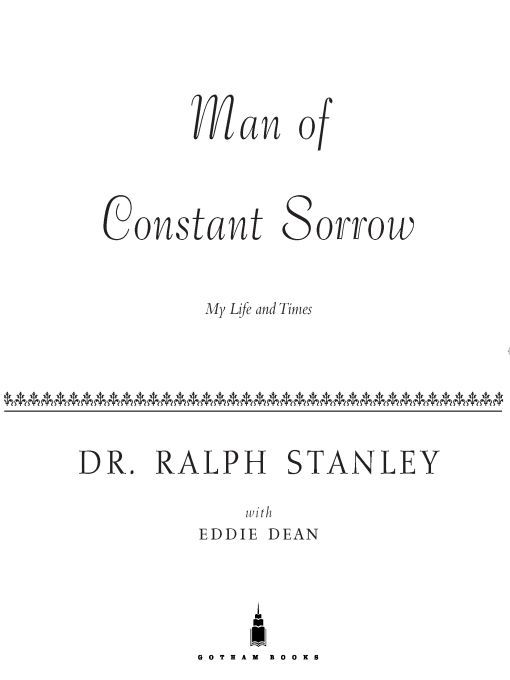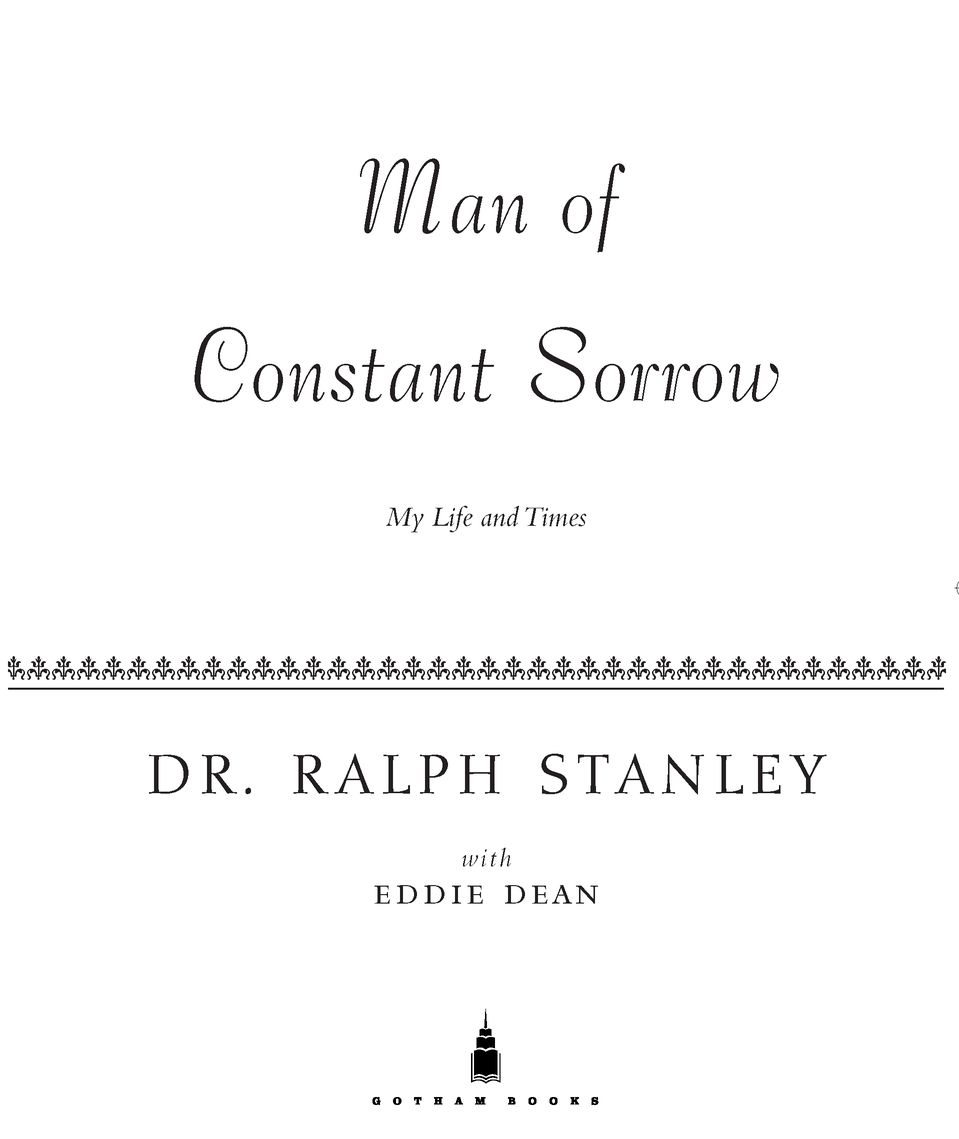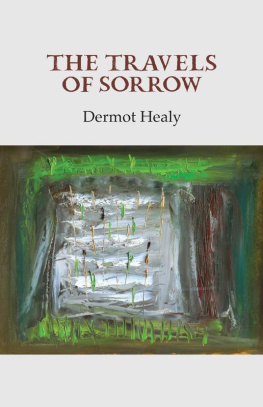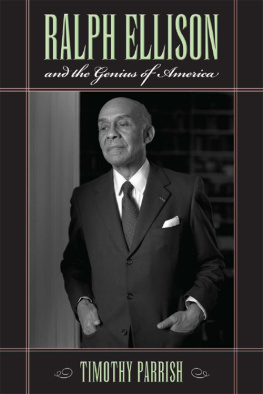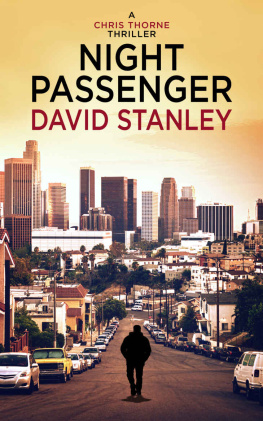Table of Contents
For my wife, Jimmi;
In memory of my mother, Lucy;
And with gratitude to all the Clinch Mountain Boys,
past, present and future.
PROLOGUE
Hills of Home
Id like to go back to the days of my childhood
And go to church in the village there
To meet my friends and old acquaintance
And sing again in the village choir
TURN BACK, RALPH STANLEY
When I was just a little boy growing up in the mountains of south west Virginia, singing was as natural as breathing. I was borned and raised way back in the hills, and a lot of our forefathers, our grandpas and great-uncles and so forth, were of the old Baptist faith, and they all had lonesome voices to sing out those sad old hymns.
This was a long time ago, back in the 1930s, and a long way back in steep hills and deep hollows.Where I come from, people lived spread out from one another. There was no radio or telephone. Days would pass between you seeing anybody outside your family. Singing was a way to keep yourself company when you got to feeling lonesome.
You could hear singing everywhere from church to the back porch, from the high ridgetops to the head of the creek, wherever there were chores to do or miles to walk or fields to work.Youd hear people tell about a mule that wouldnt budge unless the man behind the plow got to singing. Songs were handed down from father to son and mother to daughter. Singing gave you strength, and you needed plenty to get you through rough times. People from our mountains were used to going without, and singing didnt cost a cent. Not many things you can say that about.
Back in our little part of the world, singing was part of everyday living, one of the natural sounds all around us: the water running through the rocks on Big Spraddle Creek and the coon dogs barking down the hollow and the train whistle blowing as the freight cars hauled coal on the Clinchfield Railroad. Course, we didnt pay no mind it.When youre so used to something, you dont go around making a fuss over it.
But some voices stood out from all the rest.The way some birds stand out: them hoot owls and whip-poor-wills youd hear when the sun went down and it got dark in the hollow. I always enjoyed a whip-poor-will come to sit on our yard gate and sing of an evening. Some people get spooked by night birds.The old superstition says when you hear a whip-poor-will, somebodys going to die. But I was always taken with the mournful song of a whip-poor-will. It made me feel like I wasnt the only one feeling lonesome.
And thats the way it was with my voice. It was lonesome and mournful and it wasnt like nobody elses. I dont say this to brag on myself but because its true. Even today, people from all over the world tell me my voice is differentcompletely differentfrom any voice theyve heard.
I tell them Ive sung that way since I was a boy. I think God gives everybody a gift, and He wants them to use it. Ive always done my best to honor what God gave me. Ive never tried to put any airs on it. I sing it the way I feel it, just the way it comes out.
When I say I sang like this since I was just a knee-high, I mean just what I say. Im well past eighty now, but as far back as I can remember, everyone always told me I had an old-time mountain voice: what they call weathered and lived-in, like something youd hear moaning in the woods late of a night and not from the mouth of a youngun.They called me the boy with the hundred-year-old voice. I reckon if I make it another twenty years, maybe then Ill finally get to sound like my real age.
Theres a lot of people would tell me not to even bother trying to catch up. They hear something much older than a hundred years in my singing.They say it puts them in mind of the sacred chanting at a Navajo ceremony, or the gospel singing from ancient times, way back to the olden days before the written word, when people first sung out their troubles. I dont claim to know much about chanting, but the part about gospel music, well, my singing comes right out of the church.
The first time I ever sang in public was in a little country church way out in the sticks. It was a one-room building with plank benches and an old woodstove for heat. No special occasion, just another Sunday morning. You might think there wasnt much to be nervous about, but I was scared to death because my dad put me on the spot.
It was in 1935 at the Point Truth Primitive Baptist Church in Scott County,Virginia.You just about needed a search party to find it, tucked back in Long Hollow, miles from the nearest town of Nickelsville. In our type of church, the Primitive Baptists, they dont allow musical instruments whatsoever, not a piano or even a tambourine. They sing the old Baptist hymns the old-time way, a cappella-style, just the voices alone.
You may have seen in the Bible where it says make a joyful noise unto the Lord, and thats what a lot of Pentecostals and Holiness churches do around these mountains, and they play guitars and anything else handy and they get pretty rowdy. Its got a good beat to it, it makes you happy, and it makes you want to move.
But the Primitive Baptists are different.Theyre strictly business when it comes to their hymns. Its more sad and its more mournful and it fits my voice like nothing else. Usually the preacher or one of the elders will line out the songs for the congregation, which means the leader sings a verse and everybody joins in and sings it right back.
On this Sunday morning, my family was sitting all bunched together on the pew-bench like usual: my dad, Lee, and my mother, Lucy, and my older brother, Carter, and me. There was a song my dad wanted to lead on. It was from the old Goble hymnbook: Salvation, O! The Name I Love. It was one of his favorites, but he never could remember how the song started out. So he laid his hand on my shoulder and he called on me to start the song, to line it out for the congregation.
Here we were, the church-house packed and everybody waiting on me. I couldnt even look up I was so scared, just a-trembling from head to toe. I like to stare a hole in the floor and crawl inside and hide. These people were friendly enough, but this was a new church from the one I was used to, the McClure Primitive Baptist Church, close by the hollow I was from back in Dickenson County. Wed moved for a while to the neighboring county, where we lived in an old log house in Long Hollow while my dad worked a sawmill job in the area.
When you traveled mostly by foot or by horse or mule, another countyeven the next county overmight as well have been another world.To give you an idea of the distances back then: About twenty-five miles from our home place, in the coal town of West Norton in Wise County, lived the singer and banjo player Dock Boggs, who worked in the mines and made some phonograph records in the 1920s, real old-time ballads like Pretty Polly. Well, I didnt know a thing about Dock Boggs until I met him at the Newport Folk Festival in the 1960s. Nothing against Dock, it just shows you how the world was a whole lot bigger place back then, especially in the mountains of southwest Virginia.
So it felt strange and different to me, this little church in a new county filled with folks I didnt rightly know. Even if they were Primitive Baptists like us, they were more like strangers. Here I was, barely eight years old, sitting there in the pew, worried and shaking like a leaf, after my dad called me to lead that hymn.Trapped.

